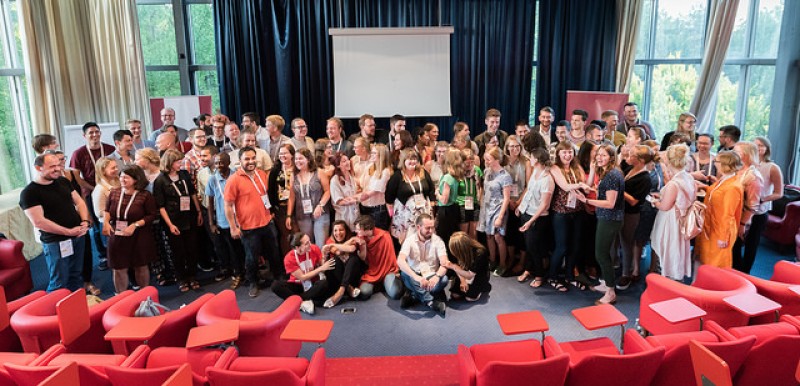Photo: Albin Hillert/CEC
Report on the Assembly, including the Pre-Assembly Youth event
By Lena Eisenblätter, CEC Intern
When I first hopped off the plane in Budapest, I didn’t know what to expect. My knowledge about the Conference of European Churches was confined to what I read on the internet. Although there are a lot of resources, documents and general information about how CEC evolved and what it does, I was still unsure about what kind of people I would meet and what I was expected to do at the Novi Sad Assembly as a Youth Advisor. In retrospect I would say that I was simply still lacking the CEC spirit.
As soon as I met other participants of the Pre-Assembly Youth Event in the arrival area of the airport, I started feeling safe and at home. On the long bus trip to Novi Sad we already bonded over conversations about our countries, confessions, and our own personal belief. Later on I had even more of those unprejudiced conversations with people from all over Europe and all over the Christian religious spectrum, which was particularly enriching for me.
The three and a half days of Pre-Assembly Youth Event were a very exciting and instructive time. It was vital for most of the group, including me, to get basic and first-hand information on Serbia, CEC, and the General Assembly procedures. Hearing many of the speakers beforehand in a smaller, less formal setting was definitely a plus for my immersion in the issues that were to be discussed at the Assembly.
There were lively discussions going on during the Pre-Assembly and some youth became very engaged, which for them led to long hours preparing the communiqué and its presentation in the Assembly. In my opinion, it would have been helpful to have some more time to write this communiqué, especially with further opportunities to consult also the quieter people, process everything, and dig a little deeper in the details of what kind of message “we as the youth” really want to convey—there has to be a message from the youth much deeper than just wanting more participation, more power. Anyway, another extra day for the youth would have probably been too exhausting. Therefore, this would have had to be at the expense of the thematic sessions on witness, justice and hospitality, which would have been sad.
A talk on Wednesday morning was actually one of the most memorable for me. Dr Sarah Gehlin of the University of Helsinki opened our eyes, among other things, on the topic of receptive ecumenism. I appreciated the conceptual approach that was surprisingly close to transfer into action. The concept of receptive ecumenism calls us to examine our attitudes in ecumenical encounters and aims at bringing new energy to frozen dialogues by focus on the guiding question: What do I (not the other) need to learn from other traditions? Receptive ecumenism is self-critical and there is no reciprocal initiative needed and therefore no need to expect that initiative from one’s counterpart. This, for me, was a simple and clear message to be put in front of all the encounters and discussions of the week.
As a youth participant of the 2018 conference, how do I see the participation of young Christians in the work of CEC for the coming years?
The larger number of participants under 30 this year and the elaborate Pre-Assembly Event are already showing the way to more youth participation. In order to integrate us in the work of CEC, there have to be these easy “entry opportunities” to get to know the organisation. Another option would be having a youth organisation for raising the next generation for CEC, but one has to beware of simply making up an alternative programme for youth. To ensure that we are also given a voice in the everyday work of CEC, the newly proposed youth quota is a good move. In general, young Christians are inspired to engage in organisations that do not only talk but make a difference and facilitate changes.
What really impressed me about the work of CEC was bringing together young members of the Croat and Serbian minorities of their respective countries with politicians and experts in Brussels in 2017. I can see that this kind of reconciliation work is needed in Europe and beyond, so for me, it is a reason to support the work of CEC.
Still, there should be more publicity, not only for these great efforts but also for steward and youth advisor programmes in the General Assembly, so that many young people hear about it, become interested and get involved. Some churches are overrepresented while I (having Baptist background) would not have heard about CEC let alone the opportunity to participate as a youth advisor, if I had not undertaken specific research to find an international ecumenical organisation. Diversity of denominational and cultural background should be enabled by working together more closely with the different churches.
This is also closely related to another big topic I took home from the Assembly, being united in Christ despite our differences. Different speakers during the week stressed that we believe in the same God and in our saviour Jesus Christ whose love always has to be our common denominator. Our unity can be a powerful message to our secular environment as well. Therefore, I would advise to make the Assembly more visible, also in the hosting city, explicitly inviting locals to worship and take part in symbolic action such as the prayer and tree planting close to the rebuilt Danube bridges.
There might even be different moral values among Christians, but although we should be open to discuss them, we are not here to judge but to show love to one another and be the hands and feet of God for this world.
